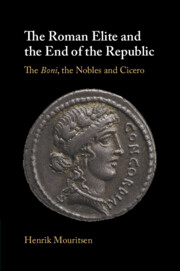Book contents
- The Roman Elite and the End of the Republic
- The Roman Elite and the End of the Republic
- Copyright page
- Contents
- Acknowledgements
- Introduction
- Part I The Boni in the Late Republic
- Part II Property and Politics
- Chapter 6 Wealth and Morality Revisited
- Chapter 7 Boni
- Chapter 8 Boni and Improbi
- Chapter 9 Otium and Tranquillitas
- Chapter 10 Vita et Bona
- Chapter 11 The Road to Perdition
- Chapter 12 ‘Egentes Sumptuosi Nobiles’
- Part III The Boni and the End of the Republic
- Appendices
- Bibliography
- Index
Chapter 7 - Boni
The ‘Gentlemen’ of Republican Rome
from Part II - Property and Politics
Published online by Cambridge University Press: 15 December 2022
- The Roman Elite and the End of the Republic
- The Roman Elite and the End of the Republic
- Copyright page
- Contents
- Acknowledgements
- Introduction
- Part I The Boni in the Late Republic
- Part II Property and Politics
- Chapter 6 Wealth and Morality Revisited
- Chapter 7 Boni
- Chapter 8 Boni and Improbi
- Chapter 9 Otium and Tranquillitas
- Chapter 10 Vita et Bona
- Chapter 11 The Road to Perdition
- Chapter 12 ‘Egentes Sumptuosi Nobiles’
- Part III The Boni and the End of the Republic
- Appendices
- Bibliography
- Index
Summary
The ambiguous relationship between wealth and morality had implications for the social and political role of the vir bonus. It took more than wealth to be a vir bonus; he also had to embody a number of other characteristics, including integrity and gravitas, and adhere to a particular dignified lifestyle. These demands meant that some men of substance did not count as proper boni in its full sense of ‘good’ and might find their status challenged. A passage in Cicero’s Pro Flacco sums up who qualified as a vir bonus and who did not. He contrasts ‘viros bonos gravisque homines’ with a ‘homini egenti, sordido, sine honore, sine existumatione, sine censu’, Flac. 52. His second, negative definition of bonus is revealing and shows that a combination of qualities was required. Wealth was the obvious precondition (census), but he also had to be satisfied with his resources (i.e. not being egens). In addition, he had to be a man of honour (honos) and enjoy general esteem and a good reputation (existumatio).
- Type
- Chapter
- Information
- The Roman Elite and the End of the RepublicThe <i>Boni</i>, the Nobles and Cicero, pp. 95 - 104Publisher: Cambridge University PressPrint publication year: 2022

